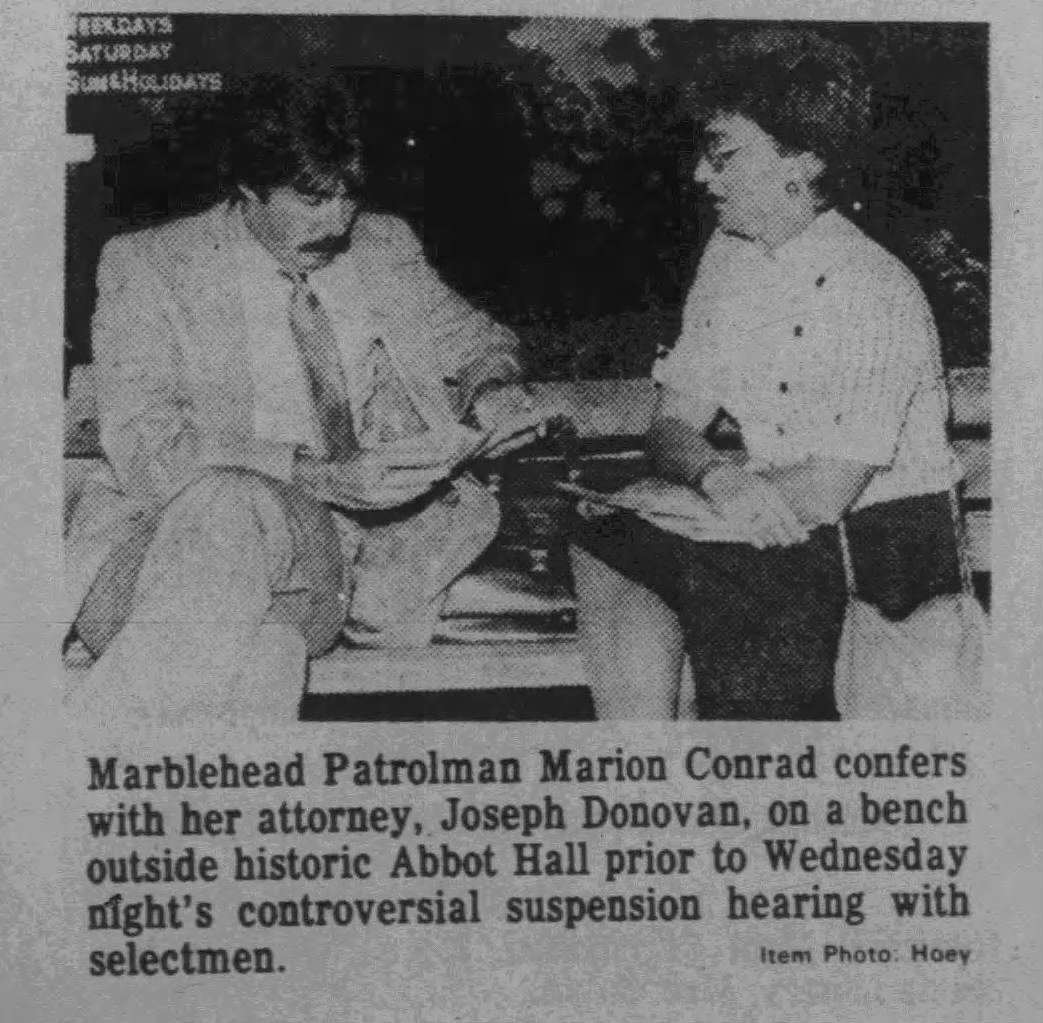In writing this column each week, I’m always amused by the ways in which stories from 40 years ago mirror current events. In the first iteration of “Blast from the Past,” I wrote about how history repeats itself. Little did I know how true that would be as I explored the archives of The Daily Evening Item each week.
All of that is to say that when I came upon the headline “Board won’t punish Marblehead cop” in a Sept. 8, 1983 Item edition, my interest was instantly piqued considering the ongoing, increasingly sprawling saga involving officer Christopher Gallo chronicled in last week’s edition. Back in my full-time Marblehead reporting days, I covered the first half of Gallo’s disciplinary hearings — a long, drawn-out affair that seems to have no resolution in sight, at least in the short term. It’s striking then that 40 years ago, the selectmen spent 90 minutes hearing the case against Patrolman Marion Conrad, who had been charged with abusing sick leave by Chief John Palmer.
At the close of that 90-minute hearing, selectmen ultimately voted 2-2 not to suspend Conrad — with Chairman Thomas McNulty and Jo Ann Meyer opposing the motion to suspend Conrad, and Selectmen William Conly and Joseph Whipple voting in favor of her five-day suspension. Conly had made the motion to suspend based on what he considered a lack of verification on Conrad’s part regarding the circumstances surrounding the most recent allegations of sick-leave abuse brought by Palmer.
Conrad charged that Palmer sought to make her a “scapegoat or whipping boy” for the department, saying other personnel had taken almost twice as many sick days as she had but only received a warning from Palmer rather than actual discipline.
Palmer had sought a suspension “in excess of” five days for Conrad, a 1977 appointee to the department who had been suspended three times in 1982 for excessive tardiness. Conrad fired back by demanding an open hearing so she could outline her complaints in a public forum and filed a discrimination suit with the state against the chief and the town, charging harassment and discrimination on the basis of her gender. And, despite her victory with the selectmen, Conrad said she would not be withdrawing her discrimination complaint.
The request to suspend Conrad stemmed from an Aug. 9 incident, with Palmer charging that Conrad’s explanation of her absence because of sickness and a mandatory “personal” court appearance on the same day contained an “inconsistency of facts.” Palmer told the selectmen he informed Conrad two days later, on Aug. 11, that he required documentation from a medical doctor to verify her statements about being sick, and claimed he never received said documentation. His decision to request a suspension was made based on “the available information.”
Conrad’s lawyer argued that there was no just cause of the disciplinary action, telling the board that Conrad did not feel well that day, experiencing severe cramps, a high temperature, and nausea, and called in sick. She went to court despite the illness, saying she would have done so in an ambulance if necessary.
Conrad and her lawyer said Palmer went beyond the bounds of a normal inquiry, to the point of seeking explicit information about the nature of her illness and “her fears and concerns.”
Conly countered by referring to a lengthy report furnished to the board by the chief, which contained six pages worth of Conrad’s “problems with tardiness and sickness.”
“We have to look at the overall record,” Conly said.
But, Conrad said she had no intent to let Palmer see her medical records.
“My fears and concerns are my fears and concerns,” she told selectmen. “I’m not going to allow him to do this.”
Palmer, however, claimed Conrad knew about the court appearance well in advance, and told the board she had ample opportunity to talk to him. And, he added, the nurse practitioner’s letter she provided did not give enough information to provide a fair determination.
“It’s quite plain this is abuse of sick leave based on the facts,” he said.
Conrad indicated she believed she was being subject to heightened scrutiny not applied to other, male members of the department and that a suspension would be “harsh and unreasonable.”




